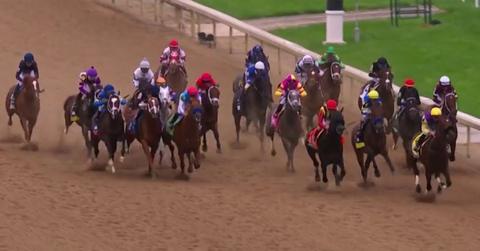So, What Actually Happens to Horses That Scratch From the Kentucky Derby?
When a horse scratches from the Kentucky Derby, several things can happen
Published May 2 2025, 1:22 p.m. ET
It's that time of year again, people — the Kentucky Derby is here! Known as "the most exciting two minutes in sports," this prestigious horse race takes place every first Saturday in May and marks the thrilling start of the Triple Crown.
While the iconic event may seem flawless on the surface, not everything goes according to plan. In fact, some horses are scratched from the Derby before it even begins. So what happens to them? Here's what we know.

What happens to horses that scratch from the Kentucky Derby?
First and foremost, it’s important to understand that a horse scratching from the Kentucky Derby can happen for a variety of reasons. One of, if not the most common cause for a scratch is injury or illness.
When a horse shows signs of exhaustion, fever, or another health issue, it's typically scratched out of an abundance of caution, both for the horse's safety and to maintain the integrity of the race. After being scratched, the horse will usually receive immediate veterinary care and be given time to rest and recover.
The recovery period depends on the severity of the issue. Some horses bounce back and return to racing later in the season, often competing in major races such as the Preakness Stakes, Belmont Stakes, or other graded events.
However, if the injury or illness is more serious, the horse might be sidelined for several months or even retired from racing altogether.
Another common reason for a Derby scratch is poor performance in final workouts. If a horse doesn't look sharp or fails to meet expectations during training at Churchill Downs, the trainer or racing officials may determine that the horse isn't ready to compete at such a high level.
In these cases, the horse is usually brought back to its home base, given rest, and then gradually returned to training. Once the horse shows improvement, it may be entered in a more suitable race down the line.
In other instances, some scratches occur due to behavioral issues. During Derby week, the intense environment can cause some horses to become overly anxious, stressed, or even aggressive. And so, if a horse is deemed mentally unfit or difficult to control, it may be scratched to protect both itself and others.
These horses are typically brought back to a familiar, calmer setting where they can rest and reset for a while. Many eventually return to training, though in some cases, if the behavior persists, retirement may be in the cards.
Finally, a horse may be voluntarily scratched from the Derby by its team for strategic reasons. This might happen if the track conditions are unfavorable, the post position is poor, or weather concerns arise.
In such cases, the decision is less about the horse's health and more about optimizing its chances for success in future races. The horse will often remain in training or be shipped home to target a different, more favorable race on the calendar.
